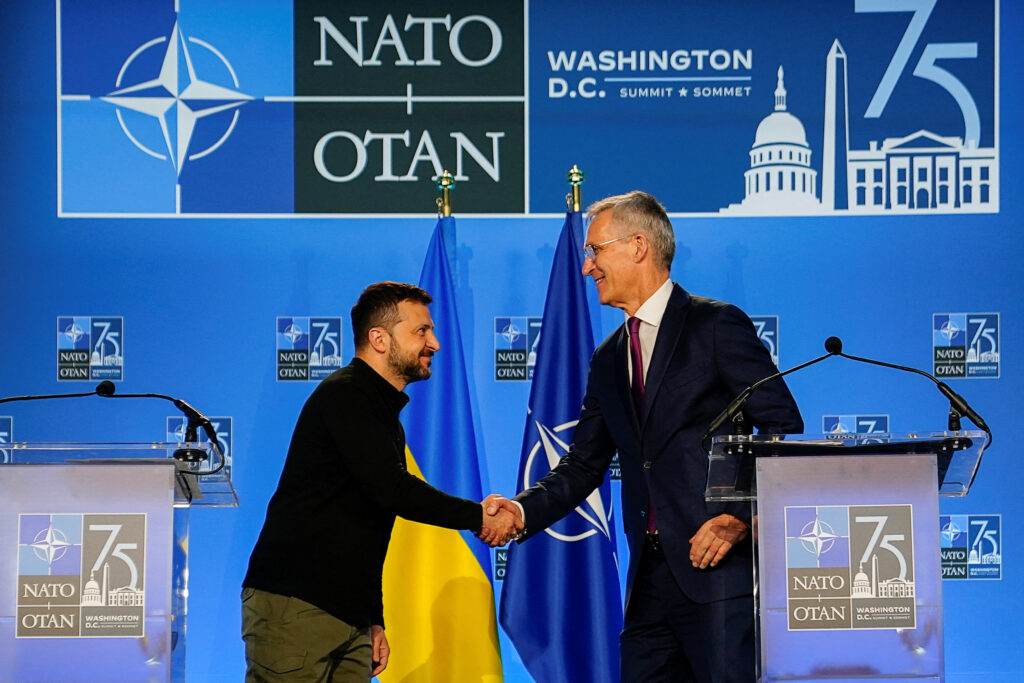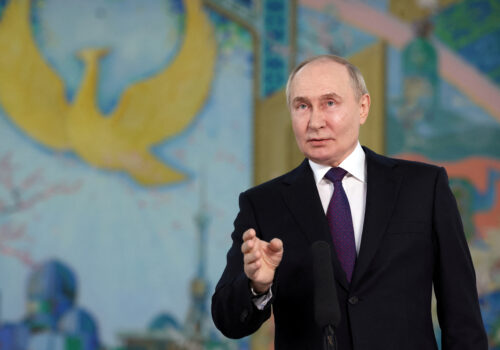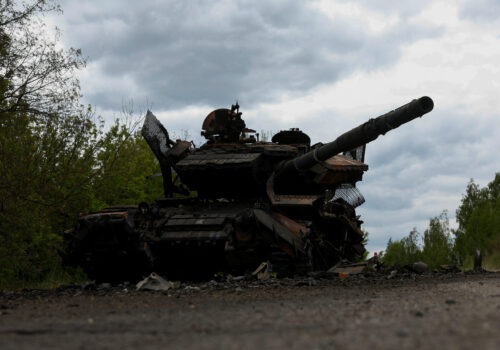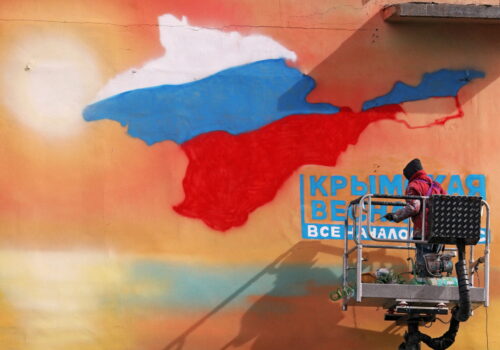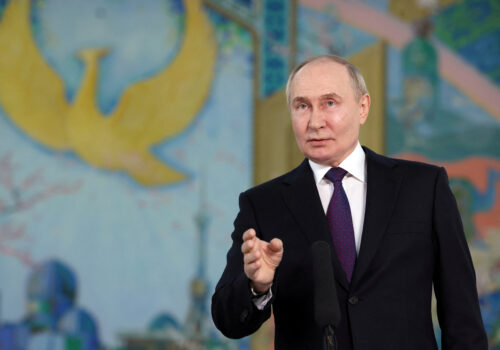
Five reasons why Ukraine should be invited to join NATO
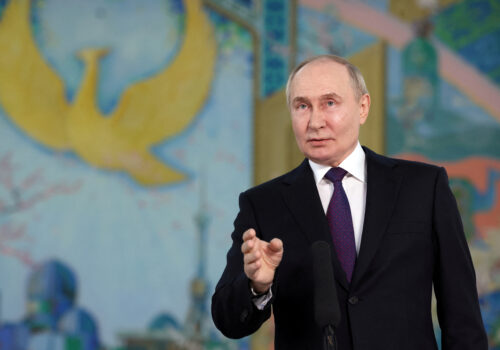
NATO leaders have this week declared that Ukraine’s path to membership is “irreversible,” but once again stopped short of officially inviting the country to join the alliance. This represents another missed opportunity to end the ambiguity over Kyiv’s NATO aspirations and set the stage for a return to greater international stability.
The ongoing Russian invasion of Ukraine was high on the agenda as alliance leaders gathered in Washington DC for NATO’s three-day annual summit. This focus on Ukraine was hardly surprising. The war unleashed by Vladimir Putin in February 2022 is the largest European conflict since World War II, and poses substantial security challenges for all NATO members.
Since the invasion began almost two and a half years ago, Russia has strengthened cooperation with China, Iran, and North Korea, who all share Moscow’s commitment to undermining the existing rules-based world order. The emergence of this Authoritarian Axis has helped underline the need for a decisive NATO response to Russian aggression in Ukraine. Alliance members are acutely aware that China in particular is closely monitoring the NATO reaction to Moscow’s invasion, with any Russian success in Ukraine likely to fuel Beijing’s own expansionist ambitions in Taiwan and elsewhere.
While there is widespread recognition that the outcome of Russia’s war in Ukraine will shape the future of international relations, this week’s summit confirmed that there is still no consensus within NATO over Ukrainian membership. On the contrary, the alliance appears to be deeply divided on the issue.
Objections center around the potential for a further dangerous escalation in the current confrontation with the Kremlin. Opponents argue that by inviting Ukraine to join, NATO could soon find itself at war with Russia. Meanwhile, many supporters of Ukrainian NATO membership believe keeping the country in geopolitical limbo is a mistake that only serves to embolden Moscow and prolong the war.
Stay updated
As the world watches the Russian invasion of Ukraine unfold, UkraineAlert delivers the best Atlantic Council expert insight and analysis on Ukraine twice a week directly to your inbox.
There are five compelling reasons to invite Ukraine to join NATO. Firstly, it would end Russian imperial ambitions in Ukraine. By formally inviting Ukraine to join NATO and announcing the commencement of accession talks, the alliance would send a clear message to Moscow that its dreams of subjugating Ukraine and restoring the Russian Empire are futile. This would represent a watershed moment for modern Russia that would likely force the country to rethink its role in the wider world.
Secondly, Ukrainian membership would significantly strengthen NATO. Ukraine boasts one of Europe’s largest, most capable, and innovative armies. For almost two and a half years, Ukrainian troops have defied expectations and successfully resisted the Russian military, which is widely regarded as the world’s second most powerful army. As a member of the NATO alliance, Ukraine would bolster Europe’s security, contributing its unique combat experience and knowledge of the most advanced battlefield technologies.
Third, inviting Ukraine to join NATO would help deter Russia from engaging in aggression or malign actions in other parts of Europe. It would confirm the counter-productive nature of Russia’s revisionist agenda and the likelihood of further negative consequences if the Kremlin continues to pursue policies hostile to the West. The security of Ukraine, eventually guaranteed by Article Five of the Washington Treaty, would ensure stability and peace throughout the Euro-Atlantic space.
Eurasia Center events
Fourth, Ukraine would be a particularly committed member of the NATO alliance. Polls consistently indicate that around three-quarters of Ukrainians back NATO membership, representing a higher level of public support than in many existing alliance members.
Ukrainian officials and Ukrainian society as a whole have a very good understanding of the responsibilities that would come with joining NATO. Throughout the past decade, Ukraine has demonstrated a high level of financial discipline, complying with NATO’s defense spending guidelines stipulating two percent of GDP. The Ukrainian military has also made major progress toward interoperability and the adoption of NATO standards.
The fifth compelling argument for Ukrainian NATO membership is the signal this would send to the international community. Inviting Ukraine to join the alliance would demonstrate the unity and resolve of the collective West at a time when Russia and other autocracies are looking for signs of weakness.
Few expected this year’s NATO summit to produce any meaningful breakthroughs toward Ukrainian membership. Nevertheless, the lack of progress will be welcomed by Russia, and will inevitably fuel frustration in Ukraine. Once again, NATO leaders have offered strong words but been unable to back this up with decisive actions.
Despite this setback, it is important to continue the debate over Ukraine’s future accession in the months ahead. Crucially, Ukrainians are not asking to join NATO immediately, and do not expect to receive the benefits of the alliance’s collective security in the context of Russia’s current invasion. Instead, they seek an invitation that will create a realistic and practical road map toward future membership.
Most Ukrainians see NATO membership as the only way to guarantee the long-term security of their nation against Russia and create the conditions for a sustainable peace in Eastern Europe. Unless a firm invitation to join the alliance is forthcoming, they fear that any ceasefire agreement with Moscow will only provide a temporary pause before Russia’s next attack.
Paul Grod is President of the Ukrainian World Congress.
Further reading
The views expressed in UkraineAlert are solely those of the authors and do not necessarily reflect the views of the Atlantic Council, its staff, or its supporters.

The Eurasia Center’s mission is to enhance transatlantic cooperation in promoting stability, democratic values and prosperity in Eurasia, from Eastern Europe and Turkey in the West to the Caucasus, Russia and Central Asia in the East.
Follow us on social media
and support our work
Image: Ukraine’s President Volodymyr Zelenskiy and NATO Secretary General Jens Stoltenberg shake hands, as they attend a press conference, during NATO’s 75th anniversary summit, in Washington, U.S., July 11, 2024. REUTERS/Nathan Howard
